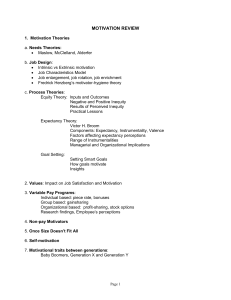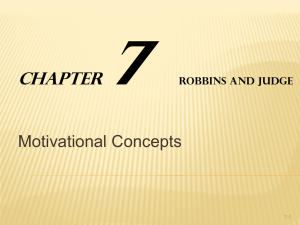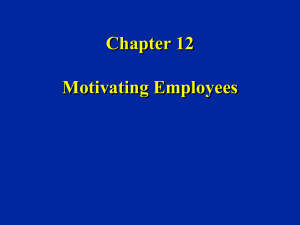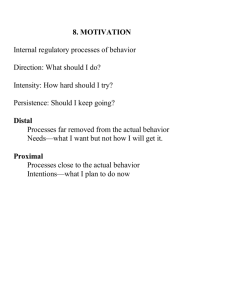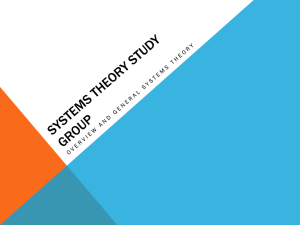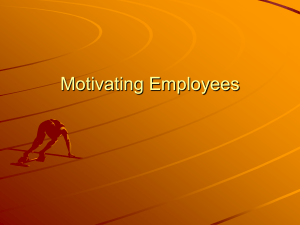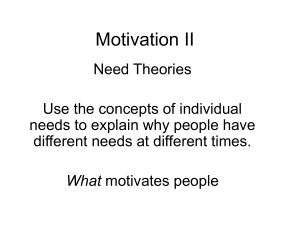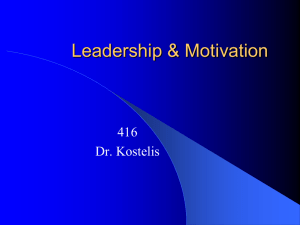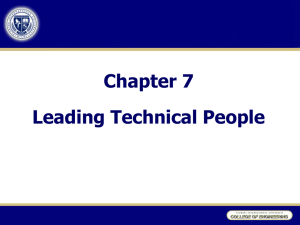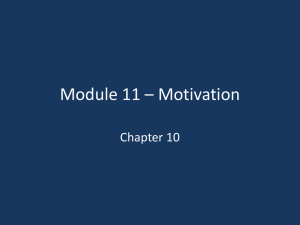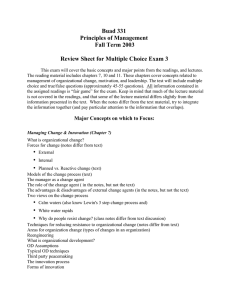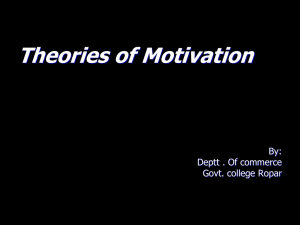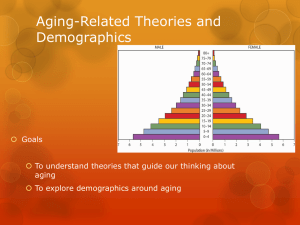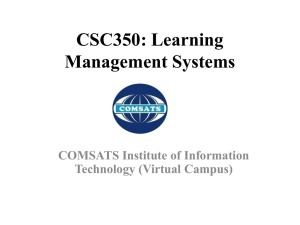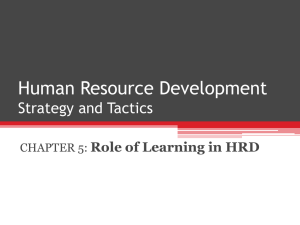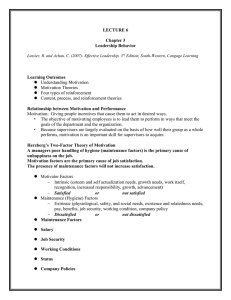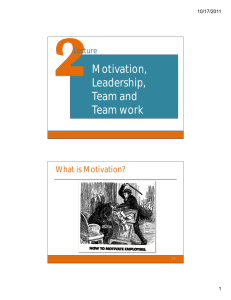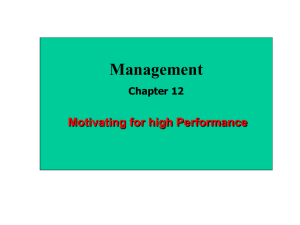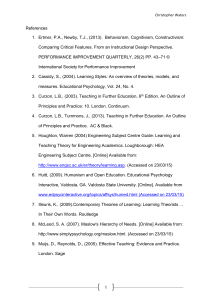Motivation - Universidad Politécnica de Valencia
advertisement
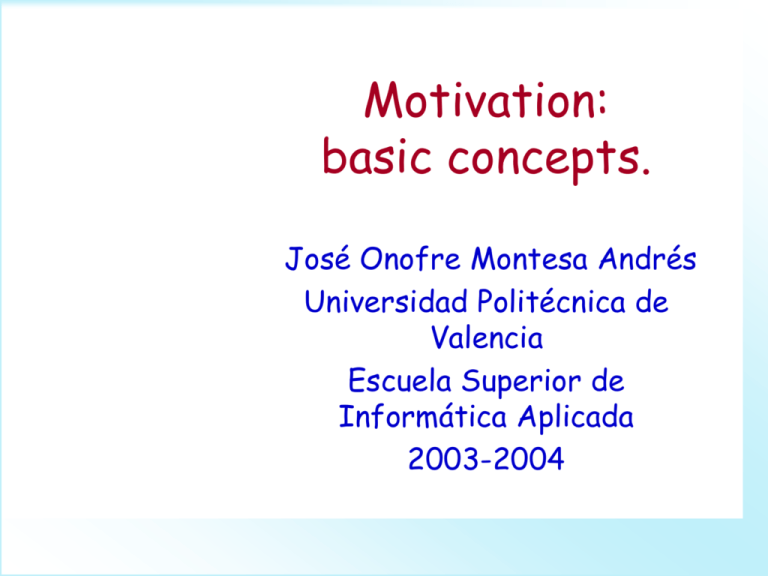
Motivation: basic concepts. José Onofre Montesa Andrés Universidad Politécnica de Valencia Escuela Superior de Informática Aplicada 2003-2004 Subjects to study • What is motivation? • Theories of motivation • Why people meats objectives. GPI- 1 What is motivation? – It’s not a personal trait, that is, some have it and others don’t. – “The willingness to exert high levels of effort toward organizational goals, conditioned by the effort’s ability to satisfy some individual need. GPI- 2 The motivation Process Search Drives behavior Satisfied need Tension Unsatisfied Need Reduction of Tension GPI- 3 Early Theories of Motivation • Maslow, hierarchy of needs theory, • Theories X and Y • Motivation-Hygiene • They represent a foundation from which contemporary theories have grow • Manager regularly use this theories GPI- 4 Hierarchy of needs theory • Maslow hypothesized this hierarchy Self actualization Esteem Social Safety Physiological GPI- 5 Theory X (McGregor) • Assumption: • Employees dislike work, are lazy, dislike responsibility, and must be coerced to perform. • Manager must do: • • • • Supervision and control. Find easy tasks to people. Document de work process. Paid well and be equilibrated.. • Expected results: • Standard production. GPI- 6 Theory Y (McGregor) – Assumption: • Employees like work, are creative, seek responsibility, and can exercise self direction. – Manager must do: • Inform employees. • Listen plans, objections and suggestions. • Allow self direction. – Expected results: • Better moral. • No change resistance. GPI- 7 Motivation-Hygiene theory (HERZBERG) dissatisfaction -40 -30 -20 -10 0 Satisfaction 10 20 30 GPI- Achievement Recognition Work itself Responsibility Advancement Grow Company policy and admin. Supervision Relationship with supervisor Work Conditions Salary Relationship with peers Personal life Relationship with subordinates Status Security 40 8 Contemporary theories • • • • • • ERG theory McCleland Theory of needs Cognitive evaluation Reinforcement theory Equity theory Expectancy theory GPI- 9 ERG • More than one need may be operative at the same time. • If the gratification of a higher level need is stifled, the desire to satisfy a lower level need increases. Grow Relatedness Existence GPI- 10 McCleland Theory of needs • Achievement need – The drive to excel, to achieve in relation to a set of standards, to strive to succeed. • Power need – The need to make others behave in a way that they would not have behaved otherwise. • Affiliation need – The desire for friendly and close interpersonal relationships. GPI- 11 Cognitive evaluation • Allocating extrinsic rewards for behavior that had been previously intrinsically reward tends to decrease the overall level of motivation. GPI- 12 Goal setting theory • ----”Just do your best”---• The theory that specific and difficult goals least to higher performance. • Tell employee what needs to be done and how much effort will need to be expended. • Feedback and self generate feedback. • Participative ser goals elicited superior performance. GPI- 13 Reinforcement theory • Concept: – Behavior is a function of its consequences Response Reinforcement Repeated Situation Action GPI- Recurred 14 Equity theory E = S own E S others E: experience, Knowledge, effort.. S: payment, advance, recognition.. GPI- 15 The four referent comparison that an employee can use: Self: employee Others Inside: current organization experience in other position Outside current organization Other jobs he … has done in other places GPI- coworkers 16 Equity theory • Choices if inequity – Change their inputs – Change their outcomes (more Quantity les Quality) – Distort perception of self (I work a lot..) – Distort perception of others (he isn’t as good…) – Choice a different referent – Leave the field. GPI- 17 Expectancy theory • The strength of a tendency to act in a certain way depends on the strength or an expectation that the act will be followed by a given outcome and on the attractiveness of that outcome to he individual. GPI- 18 Expectancy theory • We focus on three relationships: – Effort-performance relationship. The probability perceived by the individual that effort lead to the performance. – Performance-reward relationship. Degree to attainment of a desired outcome. – Rewards-Personal goal relationship. … satisfy individual goal? GPI- 19 Ability and opportunity Ability Performance Motivation Opportunity GPI- 20
